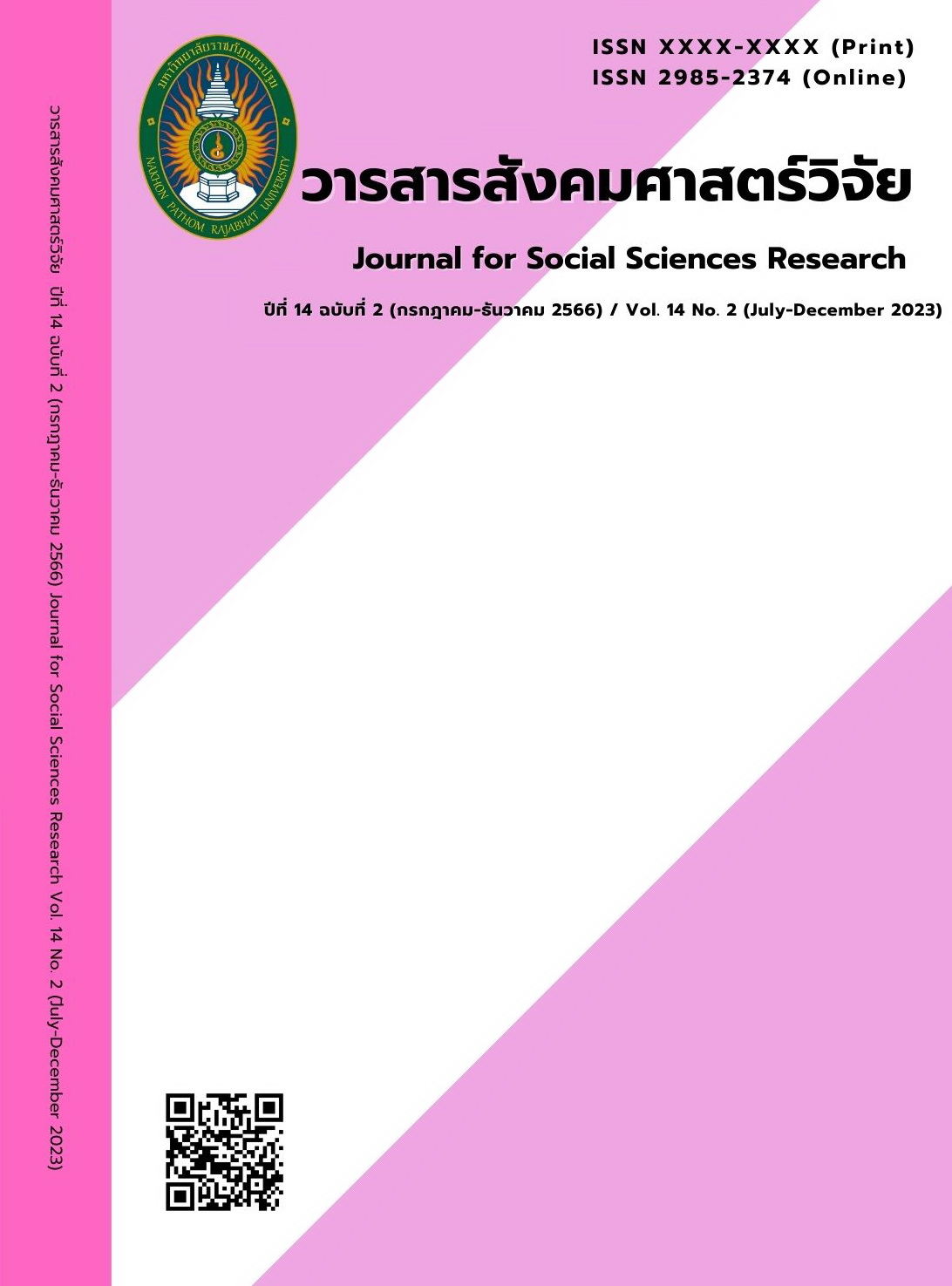KNOWLEDGE, ATTITUDE AND PRACTICE FOR SOLID WASTE MANAGEMENT WITH ZERO WASTE CONCEPT OF THUNG HUA CHANG SUBDISTRICT MUNICIPALITY, THUNG HUA CHANG DISTRICT, LAMPHUN PROVINCE
Main Article Content
Abstract
This study examined the knowledge, attitudes, and practices and their correlated factors of household solid waste management with the zero waste concept in the area of Thung Hua Chang Subdistrict Municipality, Thung Hua Chang District, Lamphun Province. It is cross-sectional research of a representative of each household with the age of 18 years and over, totaling 735. The sample size, according to Daniel’s formula (2010), accounted for 185 households. To avoid incompleteness of the data, therefore, the sample was added up to 200 households. Additionally, 30 stakeholders were selected from the purposive sampling. The data collection tool was a questionnaire that was examined for validity and reliability in household solid waste management by experts. The reliability coefficient was 0.80 for knowledge, and 0.81 for attitude and practice. The data were analyzed using descriptive statistics and Pearson correlation inferential statistics was used to analyze the factors related to the practice of household solid waste management with a zero-waste concept.
According to the study, overall, people have knowledge of household solid waste management with the concept of zero-waste at a moderate level (78.20%). Overall their attitude and practice were at a moderate level with an average of 2.90 and 2.99, respectively. The factors related to practices of household solid waste management with the zero waste concept with statistical significance were the participation in training activities on solid waste management organized by the agency in the past 6 months with a negative correlation (r = -0.15, P-Value = 0.03).
For conclusions and recommendations, data about knowledge, attitudes, and practices of household solid waste management with the zero-waste concept reflect the importance of waste problems. Therefore, this information should be applied to relevant development plans to make people understand how to manage solid waste in the household.
Article Details

This work is licensed under a Creative Commons Attribution-NonCommercial-NoDerivatives 4.0 International License.
บทความที่ได้รับการตีพิมพ์เป็นลิขสิทธิ์ของมหาวิทยาลัยราชภัฏนครปฐม
เนื้อหาของแต่ละบทความเป็นทัศนะของผู้เขียน ซึ่งที่ปรึกษา บรรณาธิการ กองบรรณาธิการ และคณะกรรมการบริหารวารสารไม่จำเป็นต้องเห็นด้วย หรือร่วมรับผิดชอบใดๆ
References
กรมควบคุมมลพิษ. (2564). ระบบสารสนเทศด้านการจัดการขยะมูลฝอย: ข้อมูลสถานการณ์ขยะมูลฝอยของจังหวัดลำพูน. ค้นเมื่อ 6 กุมภาพันธ์ 2566, จาก https://thaimsw.pcd.go.th
กรมควบคุมมลพิษ. (2565). องค์ความรู้ “การเสริมสร้างศักยภาพองค์กรปกครองส่วนท้องถิ่น ในการจัดการสิ่งแวดลอ้ม”. ค้นเมื่อ 26 ธันวาคม 2565, จาก https://www.pcd.go.th/publication/25862
กรมส่งเสริมการปกครองท้องถิ่นและกรมควบคุมมลพิษ. (2559). แผนปฏิบัติการ “ประเทศไทย ไร้ขยะ” ตามแนวทาง “ประชารัฐ” ระยะ 1 ปี (พ.ศ. 2559-2560) มติคณะรัฐมนตรี วันที่ 20 กันยายน 2559, ภายใต้แผนแม่บทการบริหารจัดการขยะมูลฝอยของประเทศ พ.ศ. 2559-2564. กรุงเทพฯ: กรมส่งเสริมคุณภาพสิ่งแวดล้อม.
กองสาธารณสุขและสิ่งแวดล้อม เทศบาลตำบลทุ่งหัวช้าง. (2563). ข้อมูลการจัดการขยะในเขตเทศบาลตำบลทุ่งหัวช้าง ประจำปีงบประมาณ พ.ศ. 2563. ลำพูน: เทศบาลตำบลทุ่งหัวช้าง.
กองสาธารณสุขและสิ่งแวดล้อม เทศบาลตำบลทุ่งหัวช้าง. (2565). ข้อมูลการจัดการขยะในเขตเทศบาลตำบลทุ่งหัวช้าง ประจำปีงบประมาณ พ.ศ. 2565. ลำพูน: เทศบาลตำบลทุ่งหัวช้าง.
ปัทมาภรณ์ สุวรรณปักษิน และสรัญญา ถี่ป้อม. (2559). การศึกษาการจัดการมูลฝอยที่ประสบความสำเร็จของชุมชนตนแบบ กรณีศึกษาชุมชนที่ได้รับรางวัลชนะเลิศการประกวดชุมชนปลอดขยะ Zero Waste ในเขตเทศบาลนครพิษณุโลก. วารสารวิจัยสาธารณสุขศาสตร์ มหาวิทยาลัยนเรศวร, 9 (2), 17-25.
มธุรส บุญติ๊บ, สามารถ ใจเตี้ย และสิวลี รัตนปัญญา. (2565). ผลกระทบสุขภาพจากการจัดการขยะมูลฝอยชุมชน กรณีศึกษาเทศบาลตำบลเมืองยาว อำเภอห้างฉัตร จังหวัดลำปาง. วารสารสาธารณสุขล้านนา สำนักงานป้องกันควบคุมโรคที่ 1 เชียงใหม่, 18 (2), 77-90.
รัฐสภาไทย. (2563). นโยบายประชารัฐ: แนวทางการจัดการขยะประเทศในไทย. ค้นเมื่อ 26 ธันวาคม 2565, จาก https://www.parliament.go.th/ewtadmin/ewt/parliament_parcy/ewt_dl_link.php?nid
วิภาณี อุชุปัจ. (2561). ความรู้ พฤติกรรมในการจัดการขยะของประชาชนและคุณภาพการบริการในการจัดการขยะขององค์การบริหารส่วนตำบลเหล่ายาว อำเภอบ้านโฮ่ง จังหวัดลำพูน. วิทยานิพนธ์สาธารณสุขศาสตรมหาบัณฑิต สาขาวิชาสาธารณสุขชุมชน บัณฑิตวิทยาลัย มหาวิทยาลัยราชภัฏเชียงใหม่.
ศักดิ์ศรี สืบสิงห์. (2563). การพัฒนารูปแบบการจัดการขยะของชุมชนโดยใช้กระบวนการทางสิ่งแวดล้อมศึกษา กรณีศึกษา: ตำบลท่าม่วง อำเภอเสลภูมิ จังหวัดร้อยเอ็ด โดยใช้กระบวนการทางสิ่งแวดล้อมศึกษา. วารสารวิจัยราชภัฏเชียงใหม่ มหาวิทยาลัยราชภัฏเชียงใหม่, 22 (1), 235-252.
สิตศรรษ์ วงษ์อนันต์. (2561). การศึกษาการจัดการขยะมูลฝอยของประชาชนในหมู่ 10 ตำบลขามใหญ่ อ.เมือง จ.อุบลราชธานี. วารสารวิทยาศาสตร์สุขภาพ วิทยาลัยพยาบาลบรมราชชนนี สรรพสิทธิประสงค์, 2 (3), 32-47.
องค์การบริหารส่วนตำบลท่าเยี่ยม. (2564). แผนพัฒนาท้องถิ่น (พ.ศ. 2561-2565). พิจิตร: องค์การบริหารส่วนตำบลท่าเยี่ยม.
Daniel, W. W. (2010). Biostatistics: Basic concepts and methodology for the health sciences (9th ed.). New York: John Wiley & Sons.
International Water and Sanitation Centre. (2003). The gender and water development report 2003. Netherlands: Gender and Water Alliance. Retrieved 26 December 2022, from https://www.un.org/waterforlifedecade/pdf/un_water_policy_brief_2_gender.pdf
Kaza, S., Yao, L., Bhada-Tata, P. & Van Woerden, F. (2018). What a waste 2.0: A global snapshot of solid waste management to 2050. Washington, DC: World Bank Publications.


